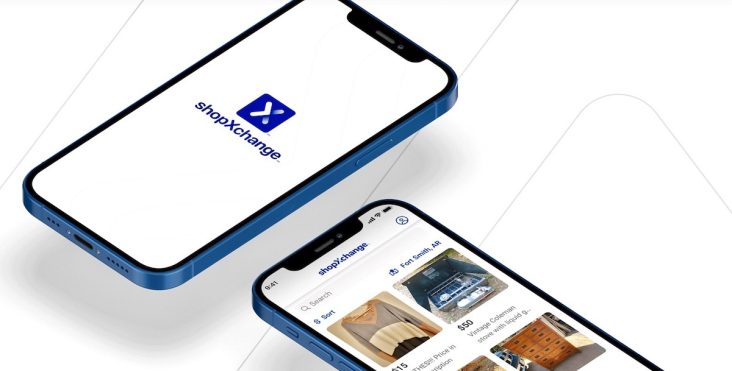Desire to get rid of stuff pushed doctor to launch ShopXchange
by June 24, 2024 10:50 am 542 views

When Dr. Wanda Vaughn told her family of the brilliant idea she had for creating a safe way for people to get rid of unwanted items in their home while earning passive income, they told her to put her money where mouth is.
She did.
ShopXchange, an app that allows people to easily buy or sell items in the Fort Smith metro without meeting with a stranger, was created by Vaughn
It took almost two years for the app to be developed, but in the three months since it went live, there are hundreds of items listed on the site and transactions happening in the Fort Smith area.
The idea for ShopXchange formed during the Covid-19 pandemic in 2020 when Vaughn, her husband and three sons, all in their 20s, were back under one roof.
“We’re a Shark Tank family, a very competitive family,” Vaughn said. “If someone had an idea, we’d often be like, ‘Eh, that’s OK. We are very opinionated.”
But then Vaughn had an idea for a marketplace that allowed people to sell unwanted household items in a safe manner, and the family agreed the idea wasn’t “that bad,” she said.
 “They all thought there had to be something out there like that,” Vaughn said.
“They all thought there had to be something out there like that,” Vaughn said.
GETTING RID OF STUFF
But it turned out there wasn’t. Vaughn, a self-professed “hoarder by default,” said she had a house and storage units filled with items that no one wanted but that were still in good condition and needed a home.
“I value money, and I value things. And it is so hard for me to throw things away. I kept things because I thought my kids were going to use it,” she said.
When her children said they did not want any of the saved items, Vaughn knew she needed to get rid of them. But she couldn’t find a good way to do that.
“I believe in recycling. It was hard for me to just say ‘Ok, go to Goodwill and give it away.’ That’s a billion dollar company, and they are making a bunch of money off of us,” she said.
She wanted something that would allow people to recycle, earn a passive income and recoup some of the money they work hard to earn. Not having a Facebook page, she wasn’t keen on selling on Facebook Marketplace. She wanted a safer alternative.

“I didn’t want to do garage sales, I do not do Facebook. … I don’t want to go meet someone in a parking lot. I have used consignment stores in the past, but they want things brought in by season, and I don’t have time to do that a lot,” Vaughn said. “So as busy as I am, there was nothing out there. What does a working woman/mother do? How does she get rid of her stuff?”
Vaughn has owned and operated the Arkansas Vision Development Center in Fort Smith for 19 years. She is an adjunct professor at two universities, has a residency program, and runs a busy clinic. She wanted something that allowed everyone, whether equally busy or equally unfamiliar with technology, to have a place where they could easily sell their items and earn some money.
“Families need more ways for passive income,” Vaughn said.
THE PROCESS
ShopXchange allows people to buy and sell items without ever meeting the other person. It ensures safe and secure transactions with robust security measures. Vaughn said the app encourages users not to disclose their real identities. What makes it stand out from other selling platforms is how items change hands. Instead of boxing and shipping merchandise, meeting someone to exchange an item, or having someone come to your house to pick up a sold item, ShopXchange has existing brick-and-mortar business locations as drop-off and pickup locations.
“You (the seller) never meet that person (the buyer). You don’t know who they are. There is never a chance to dicker with them,” Vaughn said.
Items are posted on the site. The more information and photos that are provided on the item, the better, Vaughn said. The buyer then selects a distribution location from a drop-down menu depending on the size of the item and how far they are willing to travel to drop off the item.
“When you post, you are asked ‘Will it fit in a backpack?’ That is critically important because not a lot of sites can hold big items,” Vaughn said.
Through research, they found that many people want a place where they can sell large items, like furniture, and there are exchange businesses that can handle larger, bulkier items. Buyers purchase items directly on the site. They make their payments, which are deposited into a Stripe holding account. The seller is then notified of the sale, and they have a specific amount of time to take the item to the exchange business they selected.
The seller is given a drop off number. When the item is dropped off, the buyer is notified. They are given a number to give to the drop-off site and have a specific amount of time to pick up their item. Once the item is picked up, the money is transferred into the seller’s account. When someone comes to pick up an item, they can decline it but only if the photo posted of the item is a misrepresentation, Vaughn said.
“But if they accept it, the money is automatically distributed to the seller and the site. If they don’t get to the site to pick up the item in the allotted time (18 working business hours), the money is still distributed. It is their responsibility to get to the site and pick up their purchase,” she said.
The seller is in complete control of the price of items for sale and can take items off the site at any time. Anything except drug paraphernalia and guns can be sold on the site, though they are working on ways to make certain that any electronics sold are in proper working condition, Vaughn said.
THE STARTUP COST
The app and the Vaughns retain 20% of the sale price, which Vaughn said is just “enough money to fuel the app.” In the future, she said she hopes advertising on the app will bring in more revenue. The drop-off site gets a “small percentage” and the seller gets the rest, Vaughn said. Along with getting a small percentage of the sale, exchange sites get the benefit of foot traffic in their businesses.
“We think this is a win-win for the community. A lot of people aren’t going into businesses and advertising can be expensive for small businesses. This gets people into their store. Hopefully, they’ll walk around and find other things they want to buy,” Vaughn said.
When having the app developed, Vaughn said she was certain she wanted something that was easy to use for everyone.
“We want people to be able to use it easily. I couldn’t tell you how to maneuver through my phone. I want something easy enough that my 87-year-old mother-in-law could work through it.”
The business was 100% self-funded with the Vaughn family, adult sons including, investing $300,000 to $500,000 of their savings into the development of the app.
“At this point, we wanted total control. We have invested a lot of our savings into it,” Vaughn said. “I had no idea how much an app would cost.”
Though they could have gotten an app developed for less if they had gone out of state or out of the country, Vaughn said they wanted to use an Arkansas company, which was Siloam Springs-based Square 6.
The business type and logo received a patent in May.
“It’s finally patented, it took two years. … It’s so unique that I wanted to patent it. It might help us. It might not,” Vaughn said. “Now that it’s patented, we are hoping it will be big – a big name coming from Arkansas.”
The app had a soft launch in the first quarter of the year. More users have been added to the app since the patent was granted.
“We want to keep it local for now. We want to get feedback, see how we can make it better, how we can service the community better,” Vaughn said.
By the end of the year, the hope is that it can spread throughout the United States. The app is available through the App Store (Apple) and Google Play.
